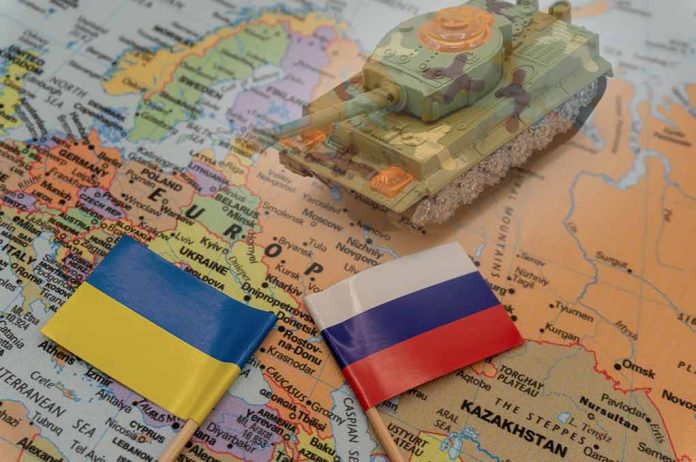
Russia accuses Serbia of “shooting Russia in the back” through covert arms sales to Ukraine, potentially shattering decades of Slavic brotherhood and threatening President Vucic’s delicate balancing act between East and West.
Key Takeaways
- Russia’s Foreign Intelligence Service (SVR) has publicly accused Serbia of secretly supplying ammunition to Ukraine while claiming neutrality in the conflict
- Serbian President Aleksandar Vucic faces criticism from both Russian officials and domestic opposition groups for potentially damaging relations with Moscow
- The SVR alleges Serbian defense manufacturers are using fake end-user certificates and intermediary countries to disguise weapons shipments to Ukraine
- Serbia remains dependent on Russian energy supplies while simultaneously pursuing EU membership, creating a precarious diplomatic position
- The accusations come despite Serbia’s refusal to join Western sanctions against Russia and Vucic’s recent attendance at Russia’s Victory Day parade in Moscow
Russia Accuses Serbia of Betrayal Through Arms Sales
Russia’s Foreign Intelligence Service has delivered a sharp rebuke to longtime ally Serbia, accusing its defense industry of “shooting Russia in the back” by supplying ammunition to Ukraine while officially maintaining neutrality. The allegations specifically claim that Serbian weapons manufacturers have provided hundreds of thousands of artillery shells and over a million rounds of small arms ammunition to Ukrainian forces fighting against Russian troops. This represents a potential fracturing of the historically strong relations between the two Slavic nations that have shared cultural, religious and political ties for generations.
The intelligence service’s statement pulled no punches in its assessment of Belgrade’s actions: “Serbian defense enterprises, contrary to the ‘neutrality’ declared by official Belgrade, continue to supply ammunition to Kyiv,” stated the Russian Foreign Intelligence Service, SVR. The agency further emphasized the lethal purpose of these supplies: “It is unlikely that such supplies can be justified by ‘humanitarian considerations.’ They have one obvious purpose — to kill and maim Russian military personnel and the civilian population of Russia.”
Belgrade’s Diplomatic Tightrope
President Aleksandar Vucic now finds himself in an increasingly precarious position attempting to maintain Serbia’s traditional alliance with Russia while simultaneously pursuing European Union membership. The accusations have prompted a discussion between Vucic and Russian President Vladimir Putin, with both leaders agreeing to form a working group to investigate how Serbian weapons might be reaching Ukraine. Serbian officials had previously denied direct arms exports to Ukraine after Russia raised concerns about potential deliveries earlier this year.
“Serbia’s military industry is trying to shoot Russia in the back,” claimed the Moscow-based spy agency. “The cover for anti-Russian actions is a simple scheme using fake end-user certificates and intermediary countries,” the agency further alleged, suggesting shipments are being routed through countries including the Czech Republic, Poland, Bulgaria, and unspecified African nations to disguise their ultimate destination.
Domestic Political Fallout
The revelations have sparked intense criticism from opposition parties within Serbia, particularly nationalist factions that strongly favor maintaining close ties with Moscow. The Dveri party, a right-wing nationalist opposition group, seized on the accusations to attack Vucic’s leadership. “It’s clear now that Aleksandar Vucic’s regime openly works against the interests of Serbia and its citizens by openly taking one side, thus undermining Serbia’s political position,” stated Ivan Kostic, a prominent opposition figure.
“The contribution of Serbian defense industry workers to the war unleashed by the West, the outcome of which Europe would like to see as a ‘strategic defeat’ of Russia, amounts to hundreds of thousands of shells … as well as a million rounds of ammunition for small arms,” the SVR statement declared, highlighting the significant scale of the alleged weapons transfers.
Conflicting Interests and Energy Dependencies
Serbia’s position is further complicated by its substantial reliance on Russian energy supplies. The country is currently negotiating a new gas import deal with Gazprom PJSC even as these diplomatic tensions escalate. Despite condemning Russia’s invasion of Ukraine at the United Nations, Serbia has consistently refused to join Western sanctions against Moscow, a stance that has already slowed its EU membership aspirations. This latest controversy threatens to force Vucic into choosing between Eastern ties and Western integration.
The timing of Russia’s accusations remains puzzling to many observers, as Serbian arms exports to Ukraine have reportedly been occurring since at least 2023. Some analysts suggest this public diplomatic pressure may be aimed at forcing Serbia to more explicitly choose sides in the broader geopolitical conflict between Russia and NATO-aligned nations. If true, the strategy appears designed to test the limits of Vucic’s balancing act between maintaining Russian support and pursuing closer Western integration.







